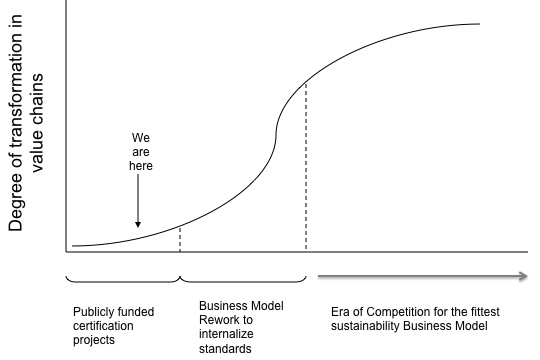Many will have seen the critically acclaimed documentary called The Corporation. One of the key points that stuck with me was that whilst the corporation is considered a legal person, just like any other biological person, it is not accountable in the same way. The biological person will be held accountable for her actions in court on a very personal note. With the corporation, pointing out accountability is decidedly more complex, as the actions of the legal persons with the corporation and the corporation itself are legally severed. One sues the corporation, but not the people working within the corporation, no matter how much the obvious points to a situation of personal accountability: remember this guy?
Now back to sustainable development. If you would want to see the firm change its behavior to a more sustainable manner of conduct, then given what The Corporation documentary highlighted, playing the accountability card is a difficult one. You can delve into the details of Harvard Professor John Ruggie’s walk on the tightrope between corporate accountability and “sphere of influence” in safeguarding human rights for waking to the complexity of the accountability issue at hand, be my guest. But, holding the firm accountable is hard, as is concisely taking up responsibility and influence for the firm, for that matter.
The high road of holding firms accountable to a principle is thus difficult if not impossible. The alternative is to take a pragmatic perspective, taking an open view, looking at at ways for positive encouragement. Publicly funded initiatives for certification of value chains is such an approach promoting higher trade standards. But the inherent design flaw in certification schemes is already starting to show a declining growth rate. The picture below shows where it has led us till now
In all, a next step is needed to take us beyond what funding of certification programs alone can realize. That next step could well be to look at the business model, promoting discovery of new ways forward by using business model analysis to:
- scope for impact caused by certification to the existing business model, and
- describe how certification could incentify changes to the business model to adapt itself to (properly) internalize the standards set by certification in the firm’s activity system.
The effects of using the business model could be tremendous, setting examples of successful models and failures, and kicking in a process of economic selection on competing models on integrating sustainability standards. Could this be a way forward in altering firm conduct to better behavior? The low road if you will.
